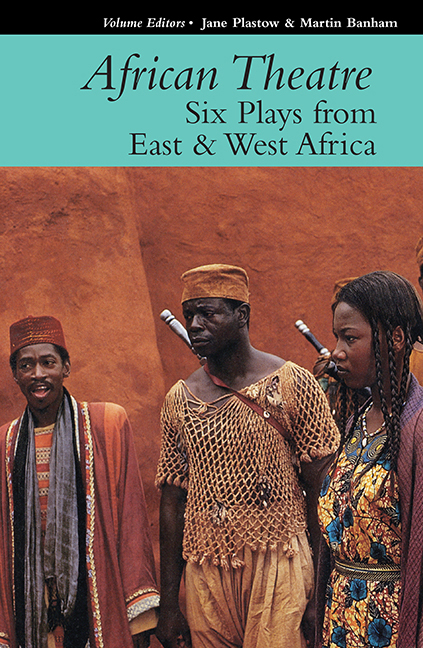Book contents
- Frontmatter
- Contents
- Notes on Contributors
- Obituary: Adieu Alain Ricard
- Preface
- THREE PLAYS FROM EAST AFRICA
- THREE PLAYS FROM WEST AFRICA
- If: A Tragedy of the Ruled
- Ola Rotimi: creating theatrical spaces
- Morountodun
- Morountodun: a retrospective commentary
- The Legend of Wagadu as Seen by Sia Yatabere
- Moussa Diagana & The Legend of Wagadu as Seen by Sia Yatabere: Advocating anarchy in Mauritania?
- Book Reviews
Morountodun: a retrospective commentary
from THREE PLAYS FROM WEST AFRICA
Published online by Cambridge University Press: 24 August 2019
- Frontmatter
- Contents
- Notes on Contributors
- Obituary: Adieu Alain Ricard
- Preface
- THREE PLAYS FROM EAST AFRICA
- THREE PLAYS FROM WEST AFRICA
- If: A Tragedy of the Ruled
- Ola Rotimi: creating theatrical spaces
- Morountodun
- Morountodun: a retrospective commentary
- The Legend of Wagadu as Seen by Sia Yatabere
- Moussa Diagana & The Legend of Wagadu as Seen by Sia Yatabere: Advocating anarchy in Mauritania?
- Book Reviews
Summary
From the beginning to the end, the dramatic action of Morountodun moves swiftly, indeed almost relentlessly, as if everything to be encountered or staged is predetermined. The play's young protagonist, Titubi, like the eponymous heroine of George Bernard Shaw's Saint Joan, is seemingly unstoppable in the manner in which she successfully engages every obstacle placed in her way; that is until the play's denouement. We first meet her as the over-pampered and decadent daughter of a wealthy, doting mother. But then with little understanding of the structural basis of her social status, Titubi transforms into a militant defender of the status quo who rapidly comes to an awareness of the threats to her privileged existence. On the cusp of this new awareness, she volunteers to infiltrate the community of rural peasants in revolt against the state, the purpose being to bring about the crushing of their rebellion. But in yet another transformation, Titubi becomes a partisan of the peasants whose cause she makes her own, having come to an understanding of the social and human costs of the oppression of the rural community. But that is not the end of the transformations in the action of the play as Titubi eventually joins others in hopes of bringing about a truce between the state and the revolting peasants, only to have her hopes for a life of personal fulfilment and social progress dashed. This occurs in the shattering denouement of the play as the leader of the revolt with whom Titubi falls in love and marries (who renames her Morountodun) is killed, together with the entire military leadership of the revolt. Thus, the sense of relentlessness or even predetermination is strong in the action of the play and it is against the structural background of this relentlessness that we are confronted by the fact that Osofisan does everything he can as a playwright to undermine and complicate this impression. This is important because, in the opinion of this critic, this is the source of the considerable artistic achievement of the play.
Aspects of Morountodun that illustrate this claim that its artistic power derives from a juxtaposition of sweeping, relentless action with expressive and performative idioms that both slow down and complicate the action are diverse.
- Type
- Chapter
- Information
- African Theatre 16: Six Plays from East & West Africa , pp. 249 - 261Publisher: Boydell & BrewerPrint publication year: 2017



